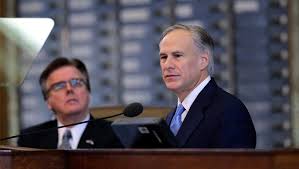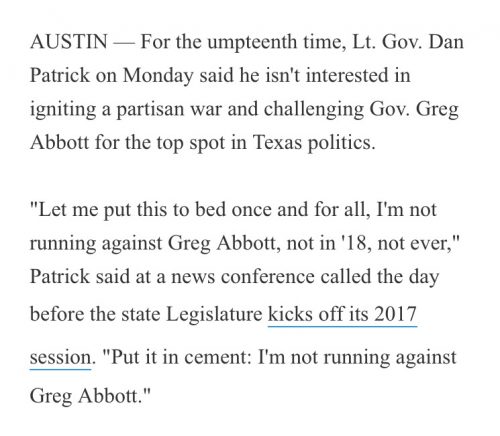Quorum busting via nonattendance is a legitimate exercise of political power. The Harris County Republican County Commissioners recently denied Commissioner’s Court a quorum to avoid allowing a tax increase. It’s a matter of personal responsibility – a person, elected or not, should have the ability to choose to not show up for their job. However, having the ability to not show up for their job should be subject to consequences. The Democrats will continue to push a false narrative to justify walking out of the legislature to prevent voting legislation. It’s likely they will also walk out to deny redistricting so the issue is forced into the courts and away from the legislature. A statutory solution is needed to remedy the situation.
False Narrative
The Democrats are pushing many false narratives to justify their walkout. Rather than answer all of their specious allegations the Republicans need to focus on the false narrative regarding curbside voting (also known as motor voting.) The Democrats are promoting the false narrative that increasing curbside voting will help the disabled and elderly. This is a flat out falsehood. Implementing changes to the curbside voting harms the disabled. I’ve personally witnessed confusion and the attempt to abuse the process at Bayland Community Center. To their credit, the election officials there acted in conformity with the law and only the disabled individuals were allowed to curbside vote.
To begin with, a look at current law shows how the disabled and elderly are protected. Making changes to the Election Code will weaken the protections by opening up the process to others who are not currently protected. Three provisions of the Election Code are telling: (if you don’t want to read the legal a summary follows immediately after the code sections)
Texas Election Code Sec. 43.034. ACCESSIBILITY OF POLLING PLACE TO THE ELDERLY AND PERSONS WITH PHYSICAL DISABILITIES. (a) Each polling place shall be accessible to and usable by the elderly and persons with physical disabilities. To be considered accessible, a polling place must meet the standards established under Article 9102, Revised Statutes, including the following standards:
(1) the polling place must be on the ground-level floor or be accessible from the ground-level floor by an elevator with doors that provide an opening of at least 36 inches in width;
(2) doors, entrances, and exits used to enter or leave the polling place must have a minimum width of 32 inches;
(3) any curb adjacent to the main entrance to a polling place must have curb cuts or temporary nonslip ramps;
(4) any stairs necessary to enter or leave the polling place must have a handrail on each side of the stairs and a nonslip ramp; and
(5) the polling place may not have a barrier that impedes the path of a person with physical disabilities to the voting station.
Sec. 61.012. ACCESS BY PERSONS WITH DISABILITIES. (a) Except as provided by Section 61.013, each polling place must provide at least one voting station that:
(1) complies with:
(A) Section 504 of the federal Rehabilitation Act of 1973 (29 U.S.C. Section 794) and its subsequent amendments;
(B) Title II of the federal Americans with Disabilities Act (42 U.S.C. Section 12131 et seq.) and its subsequent amendments; and
(C) the requirements for accessibility under 42 U.S.C. Section 15481(a)(3) and its subsequent amendments; and
(2) provides a practical and effective means for voters with physical disabilities to cast a secret ballot.
Sec. 64.009. VOTER UNABLE TO ENTER POLLING PLACE. (a) If a voter is physically unable to enter the polling place without personal assistance or likelihood of injuring the voter’s health, on the voter’s request, an election officer shall deliver a ballot to the voter at the polling place entrance or curb.
(b) The regular voting procedures may be modified by the election officer to the extent necessary to conduct voting under this section.
(c) After the voter is accepted for voting, the voter shall mark the ballot and give it to the election officer who shall deposit it in the ballot box.
(d) On the voter’s request, a person accompanying the voter shall be permitted to select the voter’s ballot and deposit the ballot in the ballot box.
In short, polling places have to comply with the ADA, be easily accessible for the elderly, and provide for curbside voting if an individual is unable to physically enter the polling location without personal assistance or the likelihood of injuring the voter’s health. If curbside voting is appropriate, the voter using curbside voting can have an individual accompanying them select the voter’s ballot – this means assist them with the voting just like if they were inside the polling location. The elderly and disabled have both ADA protections as well as curbside voting access if they are unable to enter the polling location. Opening up the process to more individuals imposes extra burden on the elderly and disabled by granting access to people who presently do not qualify and accordingly create longer wait times for the elderly and disabled.
A Statutory Fix is Needed
Under the current rules nothing can be done about quorum busting unless the absent legislators are in state. Texas law enforcement personnel can only exercise jurisdiction within the boundaries where they are empowered. The Democrats running to Oklahoma like they did to block redistricting in the past, or to DC now means they are beyond the reach of Texas law enforcement personnel. They get a free pass until they arrive, and even then, despite all the noisemaking to the contrary if they act appropriately are free from being arrested.
The pertinent Texas Constitutional Provisions state: (summary follows)
Article III Section 14
Privilege From Arrest During Legislative Session
Senators and Representatives shall, except in cases of treason, felony, or breach of the peace, be privileged from arrest during the session of the Legislature, and in going to and returning from the same.
Article III Section 40
Special Sessions; Subjects of Legislation; Duration
When the Legislature shall be convened in special session, there shall be no legislation upon subjects other than those designated in the proclamation of the Governor calling such a session, or presented to them by the Governor; and no such session shall be of longer duration than thirty days.
Article III Section 10
Quorum; Adjournments From Day To Day; Compelling Attendance
Two-thirds of each House shall constitute a quorum to do business, but a smaller number may adjourn from day to day, and compel the attendance of absent members, in such a manner and under such penalties as each house may provide.
Summary – legislators cannot be arrested if they are going or returning from the legislative session unless it is for a felony, treason, or breach of the peace. Special sessions are limited to 30 days. Although each chamber can compel attendance of absent members under such penalties as they see fit, it cannot be in conflict with the Texas Constitution and that means no arrest for absent members heading to the legislative session.
To avoid arrest all the Democrats have to do is wait out the time on the current special session. If (when) the Governor does call another special session all they have to do is to publicize they are traveling to the new session and they are protected from arrest. Simple measures ensure they escape valid arrest, and if an unlawful arrest occurs they have ample ability to seek redress in the friendly district courts in Austin.
Solutions
Both short term and long term solutions are needed to ensure the problem is prevented in the future. In the short term, the legislature should enact penalties as they see fit to compel attendance. As long as they do not run contrary to the Texas and/or United States Constitution the legislative chambers have very broad latitude. A simple solution is to both dock the absent legislator’s budget each day they are absent AND forcibly close all of the absent legislator’s offices. The legislature could act in this manner, and further they could use the daily budget docking to pay state troopers to stand watch over the offices and arrest anyone trying to enter the office for criminal trespass. Cutting the absent member’s ability to do work on behalf of their constituents is a pressure point to get them to report back to Austin.
A long term solution is also needed to prevent a reoccurrence. This was an organized effort with assistance from third parties. When the next special session is called the Governor needs to add an agenda item of creating criminal penalties for being voluntarily absent for the purpose of denying a quorum. Remember, the prohibition from arrest contains exceptions for a felony.
By making quorum denial a felony two goals are achieved. First, the absent legislators can be arrested even upon returning for the crime. More importantly, anyone assisting in the endeavor can be charged for assisting with the crime. Future walkouts will be difficult to organize if the accessories are subject to arrest for a felony. It’s hard to find a pilot to fly you or a hotel room to rent if the individuals involved are subject to criminal penalty.
These steps wouldn’t be a rock solid way to ensure no future walk outs occur. However taking these steps, along with codifying the Attorney General has prosecutorial authority in the venue of their choosing goes a long way to injecting fear and uncertainty to the process.


 to put Lt. Dan to the right of the Governor, and to get back into the good graces of Steve Hotze. The quest is to win over Republican primary voters. This will confound the Texas media. Most of the media that covers statewide politics covers it from the prism of Austin. This is the last place this fight will occur. Conservative enclaves in Houston, Dallas, Fort Worth, and San Antonio are about to be wined and dined in a way we haven’t seen in quite some time. Lt. Dan has been on a statewide tour explaining his great leadership skills.
to put Lt. Dan to the right of the Governor, and to get back into the good graces of Steve Hotze. The quest is to win over Republican primary voters. This will confound the Texas media. Most of the media that covers statewide politics covers it from the prism of Austin. This is the last place this fight will occur. Conservative enclaves in Houston, Dallas, Fort Worth, and San Antonio are about to be wined and dined in a way we haven’t seen in quite some time. Lt. Dan has been on a statewide tour explaining his great leadership skills.